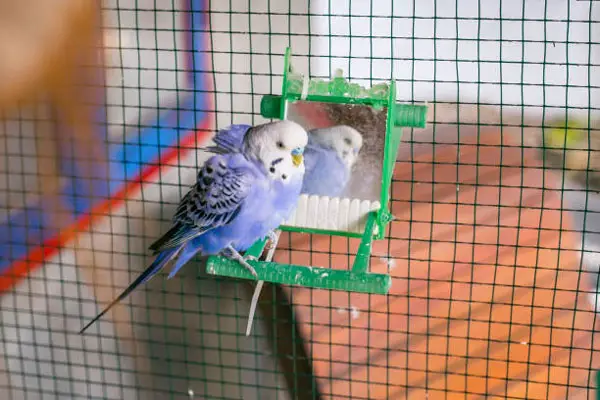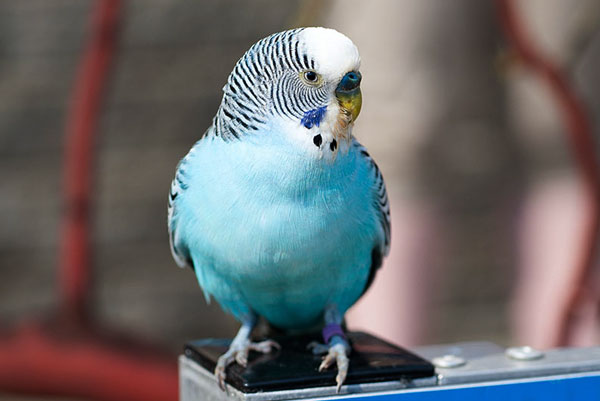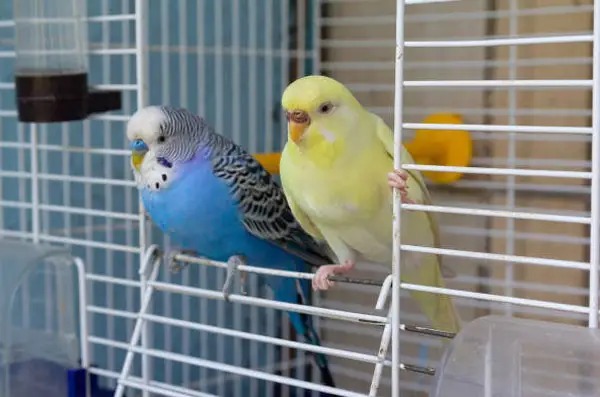Despite spending most of their time indoors, pet budgies can get affected by various diseases. Knowing the common health issues likely to attack your budgies and their symptoms will help you get your budgie treated and stay healthy.
The most common health problems in budgies include respiratory infections, budgie fever, mite infestation, feather picking, yeast infections, tumors, goiter, avian gout, and sour crop, among others.
This guide gives you full details about the most common health problems that budgies may encounter and how to treat them. We have also provided tips on how to prevent these illnesses from occurring.
Common health problems in budgies and how to treat them

Here are the most common illnesses in budgies and the treatment options for each of them:
Respiratory infections
Respiratory infections are one of the most common budgie health issues. Symptoms include coughing, sneezing, wheezing, and labored breathing.

If you think your budgie has a respiratory infection, take him to the vet ASAP!
Your vet may recommend antibiotics, anti-inflammatory, or antifungal medication to help clear up the infection.
Avian Gastric Yeast (AGY)
This gastric yeast infection is caused by your budgie coming into direct contact with infected food, fecal matter of infected birds, or yeast microbes present in the environment.

The key symptom of this infection is weight loss. Since AGY affects digestion, you may also notice the presence of food particles in your budgie’s droppings and vomiting of mucus and food.
This infection is treated by administering drugs and recommending a healthier diet. A vet may recommend getting rid of all yeast-feeding sugary food in your budgie’ diet.
Avian Gout
Too much protein or calcium in your budgie’s diet or salt poisoning can put your pet bird at risk of avian gout by causing damage to the kidney.
A budgie will display symptoms like diarrhea, a puffed-up appearance, and swollen toes.
After finding out what caused gout, a vet will prescribe the right medication or recommend changes in your budgie’s diet/routines.
Budgie candidiasis
Candida, a small organism, is responsible for this yeast infection in budgies. The disease can manifest anywhere on your budgie’s digestive system, from the crop downwards.
Common symptoms include vomiting, watery/loose droppings, loss of balance, and shaking fits.

Avian vets usually treat this disease by prescribing drugs that target yeast infection. They may also recommend eliminating yeast-feeding sugars in your bird’s diet.
Sour crop
This is another yeast infection common in budgies that affects the bird’s crop. It causes it to swell, resulting in foul-smelling vomit.
A vet will treat this illness by prescribing drugs to fight the yeast infection.
Budgie fever (Psittacosis)
This disease is so common in budgies that it’s estimated up to 30% of pet budgies and 1% of wild budgies have it. (Source).
The carriers of this disease usually show no symptoms and only pass it through their droppings and saliva.

A budgie suffering from this health issue will have loose green droppings in addition to experiencing breathing problems.
Once a budgie has been diagnosed with this condition, it must be isolated from the rest of the flock and monitored closely.
Its cage should also be disinfected. The vet will likely prescribe some drugs or in severe cases euthanasia.
WARNING: Budgie fever can be transmitted to human beings as well, so be careful when handling a sick budgie.
Goiter
Goiter, or simply iron deficiency, manifests through a handful of signs including swelling of the neck, loss of voice, breathing interference, lethargy, heart failure, and regurgitation.
Giving your budgie a seed-based diet can increase its risk of goiter. This is because seeds won’t provide it with enough iodine to promote proper functioning of thyroid glands.
To treat goiter, your avian vet can administer sodium iodine injections or prescribe iodine supplements. They may also recommend an appropriate diet for your budgie.
Tumors
It’s also not uncommon for budgies to develop cancerous tumors, especially in their reproductive organs and kidneys. The older budgies are at higher risk of testicular, ovarian, and kidney cancers.
Tumors make your budgie lame on one side, a symptom that you may easily misinterpret for a leg injury. Additional symptoms include shortness of breath and weight loss.
After your budgie has been diagnosed your budgie with cancer, he’ll most likely administer lupin to shrink the tumor and prolong your budgie’s lifespan.
Mites
Mice infestation in budgies involves these little parasites attaching to the feathers, skin, and even the beak.
Your budgie will show symptoms like itching, scaly or flaky skin appearance, and loss of feathers.
If your budgie is infested with mites, the vet may prescribe an anti-parasitic drug such as ivermectin to help fight these parasites.
Feather plucking and scratching
If you notice feather picking in your budgie, it could be an indication of an underlying health problem.
Your budgie could be suffering from parasites, allergies, liver disease, malnutrition, bacterial/fungal infection, cancer, boredom, stress, malnutrition, etc.
If your budgie starts feather plucking, you’ll need to find what is causing the behavior.

If it’s boredom, try enriching its cage with toys and spend more time with it. If your budgie is stressed, identify stressors around it and eliminate them to ensure a comfortable environment for your budgie.
If your budgie shows additional symptoms, then it could be sick and you should take him to a vet.
Following a proper examination, your vet will pinpoint the exact health issue causing it and recommend the best possible treatment.
Prevention tips for budgie diseases
You can keep your budgies safe from various health problems by providing them with a healthy and balanced diet, keeping their environment clean to prevent the buildup of mold and bacteria, and ensuring they always have clean and fresh water.
Additionally, you should provide them with exercise opportunities to stay healthy and keep their environment safe from hazards such as toxic substances, open windows, etc.

Taking your budgie for regular check-ups by an avian veterinarian can also help. Your vet will be able to catch various illnesses in their early stages and treat them before they become serious.
Moreover, the vet will give you professional advice touching on proper nutrition, care, exercise, etc. to keep your budgie healthy.
Signs of illness in budgies to look out for
You can tell if your budgie is ill by looking for a combination of the common illness symptoms outlined below:

- Discharge from the eyes and nostrils
- Loss of feathers and fluffed-up feathers
- Sleeping less or more than usual
- Coughing/wheezing/sneezing
- Change in cere appearance
- Prolonged tail wagging
- Change or loss of voice
- Seizures and falling
- Breathing difficulties
- Loss of balance
- Change in bowel
- Loss of appetite
- Drooping wings
- Weight loss
- Lameness
- Paralysis
- Vomiting
- Lethargy
Final Verdict
Now you know the common health problems likely to catch up with your budgie and the treatment options for each of them. You can easily tell when your pet budgie is unwell by looking at various common signs displayed by sick budgies as discussed in the above guide.
Remember, your pet budgie can still fall victim to various diseases despite staying indoors. Taking your budgie to an avian vet for regular checkups can help catch these diseases in their early stages and treat them before they develop into serious complications.







